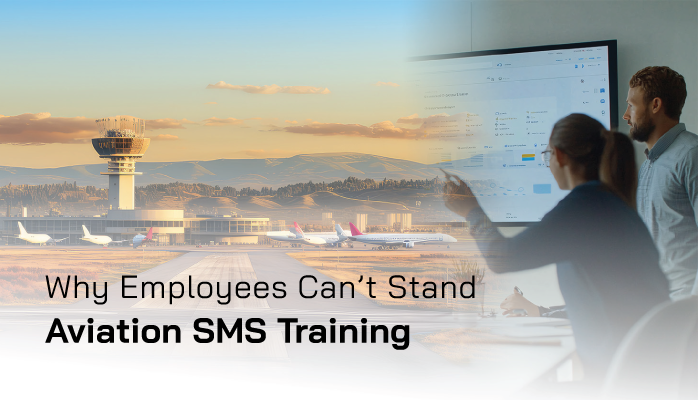Aviation SMS Training Resistance More Than Just “Boring”

I hardly need to point out how critical aviation SMS training is for the ongoing success of any aviation safety program.
Operators with well-developed safety training strategies often reap the benefits of a resilient, high-functioning aviation safety management system (SMS).
Effective SMS training can mean the difference between obligatory aviation risk management performance and willing, highly active SMS participation by all employees.
Too bad so many employees can’t stand training. SMS training is so very important to the successful operation of every SMS, especially hazard identification training. Employees are the front-line defense and are instrumental in identifying problem areas in an aviation service provider's operating processes. Less-effective SMS training courses result in lost opportunities to improve business processes and to reduce risk to as low as reasonably practical.
It’s easy to simply say that employees don’t like their SMS training because it’s boring. In reality, resistance to training has more specific underlying causes.
Related Aviation SMS Training Articles
- Understanding Role of Hazard Identification Training and Safety Reporting Forms in Aviation SMS
- SMS Chart: Where to Focus Hazard Identification Training & Risk Mitigation
- Safety Chart: How Effective Is Hazard Identification Training in Aviation SMS?
In a previous article I discussed ways to improve aviation SMS training, however, to do so, it’s helpful to identify why specifically employees don’t like their training.
And on that note, let’s briefly list the broad categories of aviation SMS training:
- Initial SMS induction training;
- Recurrent training;
- “Change” training, such as with training designed to inform of changes to technology, policies, requirements, etc.; and
- Educational training, such as Human Factors and safety culture training, etc.
While there are certainly more types, this small list should cover just about any type of training employees have to participate in. I point this list out because people often dislike different types of training for different reasons. Some employees like technical, hands-on training, while others prefer soft skills training that they can use in their interpersonal relationships, such as safety culture training.
This brings up a valid point: safety culture is affected by SMS training, just as how SMS training is received by employees is highly dependent on safety culture. This provides us with the "chicken and egg" scenario as to what comes first, i.e., safety training or safety culture. To cut to the chase, safety training develops a safety culture. If your goal is to improve the safety culture, then delivering your SMS training will need to align with the goal of improving the safety culture.
Nothing in It for Employees

Employees need to feel that there is more in training for themselves than simply learning how to “avoid getting in trouble” or “avoid screwing up.” Training designed to update employees about technology, requirements, or policies tends to fail to communicate any kind of personal incentives. Such training is usually a generic, across-the-board look at, “Here’s how the aviation SMS is changing.”
To some extent, SMS training courses should be catered to individual users’ roles in the company. Changes to the SMS should be:
- Explicitly stated in terms of how they affect different roles,
- Rather than the basic facts of the change.
In other words, it is much more effective to create training material (i.e., slideshow, supporting documents, etc.) from the point of view:
- Your role will have X changes because Y reason,
- Rather than, Here are Y reasons that the program will change.
It’s a subtle distinction, but the difference is that in the first scenario, employees can directly see what the stakes are for their position. This is simply a much more effective approach to SMS training courses.
Related Aviation SMS Training Articles
- 5 Signs of Good Aviation Risk Management Training
- 3 Top Topics for Aviation SMS Training to Focus On
- What Is Aviation Safety Training in Aviation SMS - Includes Videos to Use
Training “Blindness”
Recurrent training is an aviation SMS training requirement. This usually ends up being training material that is created once and amended with the bare minimum updates to stay current – which means that the training material hardly changes over time.
Having low employee turnover in an aviation SMS is a hallmark of an effective safety culture. However, when employees have been tenured in a company for several years or more, the recurrent training gets old quickly. I’ve heard the argument that consistency helps ingrain ideas better. But let’s face it, staring at the same material year after year only makes employees tune it out. It’s a waste of time.
Recurrent training material will benefit from a simple face-lift every year. Even small changes to the presentation format can go a long way in making recurrent training feel less recurrent. A simple way to spice up recurrent SMS training is by using external resources that have been created by:
- civil aviation authorities; and
- standards bodies (IATA, IS-BAO, Flight Safety Foundation).
The civil aviation authorities have become better at providing supporting SMS training materials over the past several years. The best resources we see come from:
- Australian CAA (CASA); and
- FAA; and
- Transport Canada.
SMS Training Is Not Personally Relevant

When employees are first introduced to a new or overhauled SMS, it can be quite a confusing experience. Initial SMS induction training is critical for starting things off on the right foot. Ideally, initial training should answer three basic questions for employees:
- What is aviation SMS?
- How do my SMS risk management processes function?
- Why should I care?
While many companies do a great job at introducing employees to their SMS, they too often forget to show employees why they should care. In other words, how is the SMS relevant to the employee's role in the company? If an employee cannot answer this after initial training, then the SMS training, no matter how comprehensive, will probably fail to feel personally relevant.
There’s the caveat. How employees feel about an aviation SMS is extremely important, and training plays a critical role in instilling those feelings. Initial SMS training should make it very clear to employees that:
- Safety performance is as important as their other duties’ performance;
- The aviation industry is inherently risky (e.g., a great place to use safety statistics) and attitudes towards SMS will heavily influence their level of safety; and
- Their involvement and input in the SMS will directly dictate the policies and procedures that set the tone for the work environment and consequently affect safety culture.
Related Aviation SMS Training Articles
- 6 Tips to Improve Aviation SMS Training Courses
- When Employees Need More Hazard Identification Training - Aviation SMS
- Best Ways to Automate Aviation Safety Training for Initial/Recurrent Requirements (Free Resources)
Final Thought: Value Training Assessment Feedback
Ideally, aviation safety managers should be receiving regular feedback about their SMS training material. Anonymous safety surveys could do wonders in this regard. For one, such surveys provide a great way to track data over time for employee satisfaction with training materials. Safety management teams should experiment with different training formats, styles, and analyze the data to see how to most effectively reach employees in ways that deliver the best results.
Studies show that people forget 90% of training material within 1 week of the training course. This is simply not acceptable in the aviation industry, especially in critical aviation safety sectors like airports and aircraft flights.
Safety management teams need to find ways to reduce resistance to training and get ahead of the “average," easy-to-forget SMS training course.
Automated SMS Training
Do you want to save time and money on managing SMS training? SMS training can be automated. SMS Pro has been working with operators since 2007. Learn how SMS Pro can benefit your organization.
Last updated in December 2024.







